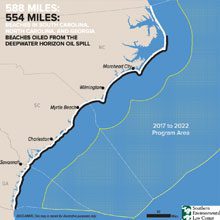 My husband and I moved to Beaufort about a year ago for the same reasons many people do: beautiful coastlines and the Marine Corps. Before moving here, we called Louisiana home. The Gulf Coast State is truly the “Sportsman’s Paradise” it proudly advertises. Louisiana and South Carolina have many similarities, including a vast array of wildlife, water bodies teeming with marine life, and a culture that appreciates and relies on these natural assets. But there is one visible and important difference – coastal South Carolina’s Atlantic Ocean horizon is uninterrupted. And this is intentional.
My husband and I moved to Beaufort about a year ago for the same reasons many people do: beautiful coastlines and the Marine Corps. Before moving here, we called Louisiana home. The Gulf Coast State is truly the “Sportsman’s Paradise” it proudly advertises. Louisiana and South Carolina have many similarities, including a vast array of wildlife, water bodies teeming with marine life, and a culture that appreciates and relies on these natural assets. But there is one visible and important difference – coastal South Carolina’s Atlantic Ocean horizon is uninterrupted. And this is intentional.
Our beaches are clean and marine economies thriving because residents and elected officials have successfully staved off the offshore drilling industry. As someone who experienced the effects of this damaging industry firsthand, I feel compelled to share the Louisiana oil experience - because the Trump administration’s decision whether to allow offshore drilling will shape the future of the Lowcountry for generations.
Luckily, we know more today than Louisianans knew 100 years ago.
A century ago, legal protections for wetlands were not in place. Consequently, oil companies in Louisiana dug 50,000 wells in Gulf Coast wetlands with little to no resistance. To provide oilrig workers access to those wells, companies dredged more than 10,000 miles of canals through Louisiana’s swamps. Later, as drilling moved further offshore, the Army Corps of Engineers dredged 550 miles of canals to accommodate larger service ships and the placement of pipelines. It’s estimated that between 30 and 59 percent of the state’s wetland loss was due to canal dredging, causing irreparable harm to breeding habitat and water quality. Today, we know that wetlands have value and there are better regulations. But there are no assurances that wetland laws – some of which are already on the chopping block - will sufficiently protect South Carolina’s precious wetlands and their dependent ecosystems.
In addition to the necessary oil industry infrastructure, we also know that the drilling itself is not good for communities. As oil is drilled beneath the ocean’s floor, layers of earth are compacted. Compaction causes the ocean floor to sink, creating a bowl. Adjacent lands – both on the ocean floor and along the coast - collapse, filling the bowl. In communities like Isle de Jean Charles, the problem is so severe that the Department of Housing and Urban Development awarded the community $48 million to relocate the entire population, creating America’s first climate change refugees. Louisiana’s coastline is sinking into the sea. Every hour, the state loses a chunk of marshland the size of a football field. State legislators have had no choice but to develop a coastal restoration plan that could cost upwards of $100 billion dollars.
Perhaps Louisiana’s most compelling cautionary tale is that of the Deepwater Horizon. On April 20, 2010, the Deepwater Horizon oilrig exploded 40 miles off Louisiana’s coast. Eleven people died. In just 90 days, 134 million gallons of crude oil gushed into the Gulf. As a direct result, more than 10 percent of the Northern Gulf Coast’s brown pelican population died. At least 27,000 endangered Kemp’s ridley sea turtles died. In the spill’s aftermath, dolphins, oysters, sea gulls and speckled trout populations all suffered.
In South Carolina, so much is at stake. Our fisheries, ocean-based tourism and recreation industry support more than 75,000 jobs and generate $4.4 billion each year to our state’s GDP. The Lowcountry understands the risks - catastrophic or otherwise - that the oil industry poses. Coastal communities are unanimous in their opposition to offshore drilling. Led by Beaufort, 24 cities and counties passed resolutions against offshore drilling and seismic testing. Congressman Mark Sanford recently sponsored the “Coastal Economies Protection Act.” Thousands of South Carolina citizens wrote to our governor to speak out against offshore drilling and speak up for our state’s coastal resources and tourism industry.
If we know that offshore oil drilling is problematic and we are against it, why are we even discussing this issue?
The Trump Administration wants to open up the Atlantic coast to oil and gas drilling and exploration – plain and simple. Other supporters of offshore drilling claim the potential oil from the southeastern Atlantic will reduce the United State’s dependence on foreign oil. Geologists, however, estimate that South Carolina’s offshore oil supply would only sustain the country’s oil needs for six days. The preservation of our pristine coastline and wildlife, our jobs and our state’s continued economic success are worth far more than a week’s supply of oil from offshore reserves.
It is imperative for all South Carolinians to weigh in on this federal decision. The Bureau of Ocean Energy Management is now accepting public comments on a review of the 5-year offshore drilling plan - the national plan President Trump would like to revise to include offshore oil and gas drilling in the Atlantic. To have your voice heard please comment at the Bureau’s website at http://bit.ly/2syWrrQ. You can also add your name to our petition, asking Governor McMaster to protect our state’s coast, through the Coastal Conservation League’s website at http://bit.ly/2sk2ory.
 Rikki Parker is a project manager in the Coastal Conservation League’s South Coast office. Born in Arthur, Illinois, she graduated cum laude from the Univ. of Evansville with a B.S. in cognitive science in 2010. Rikki earned her J.D. from Louisiana State in 2013 and served as president of the Trial Advocacy Board. After graduation, Rikki practiced in the areas of employment discrimination and environmental law. In 2015, she served as policy director to Scott Angelle’s campaign for Governor of Louisiana
Rikki Parker is a project manager in the Coastal Conservation League’s South Coast office. Born in Arthur, Illinois, she graduated cum laude from the Univ. of Evansville with a B.S. in cognitive science in 2010. Rikki earned her J.D. from Louisiana State in 2013 and served as president of the Trial Advocacy Board. After graduation, Rikki practiced in the areas of employment discrimination and environmental law. In 2015, she served as policy director to Scott Angelle’s campaign for Governor of Louisiana







